|
|
|
Sort Order |
|
|
|
Items / Page
|
|
|
|
|
|
|
| Srl | Item |
| 1 |
ID:
148300
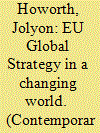

|
|
|
|
|
| Summary/Abstract |
The world is entering a period of power transition, at the outcome of which some new form of global order (or disorder) is likely to emerge. Critical to this process is the interaction between the established powers, the USA and the European Union (EU), and the emerging powers, particularly China, Brazil, India and Russia. Many analysts have classified the EU as a declining power, a perception that has been enhanced with the triple crises of sovereignty that have rocked the Union since the mid-2000s (money, borders and defence). In this context, the publication of the EU Global Strategy was an opportunity for the EU to state clearly the nature of its ongoing and future relations with the rest of the world. This article argues that, in reality, Europe as a bloc (as opposed to its member states severally) has very limited purchase with the other major powers, and an ambivalent or ill-defined grasp of how to engage with them. They, for their part, have difficulty in knowing how to understand the EU as an actor and prefer to deal bilaterally with its key member states.
|
|
|
|
|
|
|
|
|
|
|
|
|
|
|
|
| 2 |
ID:
167240


|
|
|
|
|
| Summary/Abstract |
The gap between discourse and practice which has so far prevented the EU and China from implementing the ambitious security agenda developed within the framework of their strategic partnership is caused by two main sets of impeding factors: practical, stemming from existing policies, and normative, deriving from fundamental divergences regarding the nature of an actor’s role in the international arena. Moreover, obstacles to EU-China security cooperation also stem from and are magnified at the EU member states level. Key member states lack normative and practical synergy in their understanding of security policy and the role the EU and China play in it, thus severely complicating any attempt at bridging the discourse/practice gap.
|
|
|
|
|
|
|
|
|
|
|
|
|
|
|
|
| 3 |
ID:
148317
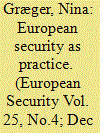

|
|
|
|
|
| Summary/Abstract |
European security is at a critical juncture and many have called for a more coherent and efficient response, involving both the EU and NATO. However, the primary tool for EU–NATO cooperation, “Berlin Plus”, has been stuck in a political quagmire since the mid-2000s, making a lot of scholars to conclude that this cooperation is obsolete and outdated. This article is challenging this view by analysing a range of informal but regular interaction patterns that have emerged. Using practice theory, it sheds new light on and explores how EU and NATO staff at all levels engage in informal practices on various sites in headquarters in Brussels and in field operations. A study of EU–NATO cooperation as practice focuses on the everyday, patterned production of security as well as what makes action possible, such as (tacit) practical knowledge and shared “background” knowledge (education, training, and experience). The article also discusses the extent to which shared repertoires of practice may evolve into loose communities of practice that cut across organisational and professional boundaries.
|
|
|
|
|
|
|
|
|
|
|
|
|
|
|
|
| 4 |
ID:
142484
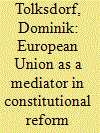

|
|
|
|
|
| Summary/Abstract |
The complex constitutional system in Bosnia and Herzegovina, intended to ensure power sharing between the three main ethnic groups, is characterized by a variety of veto rights in the legislative process. Not only has this system prevented swift decision making but it also discriminates parts of Bosnian society that do not belong to one of the three constituent peoples. The European Union, alongside other organizations, has for years called for these shortcomings to be addressed but has failed in its efforts to bring the intransigent Bosnian policy makers to agree on a compromise and to end the political stalemate in the country. The EU's activities to support constitutional reform were themselves ill fated. By introducing three criteria to systematically analyze the EU's policies, the article illustrates that the EU, after initial reluctance to become seriously engaged as a mediator in the reform negotiations, applied its conditionality inconsistently.
|
|
|
|
|
|
|
|
|
|
|
|
|
|
|
|
| 5 |
ID:
147918
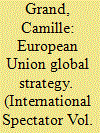

|
|
|
|
|
| Summary/Abstract |
Achieving a European Union Global Strategy (EUGS) and having it endorsed by the European Council is in itself a significant success for the High Representative/Vice President (HR/VP) Federica Mogherini. This effort to develop a new strategic document for EU’s external action was long overdue as the 2003 European Security Strategy (ESS) was clearly outdated.
|
|
|
|
|
|
|
|
|
|
|
|
|
|
|
|
| 6 |
ID:
155510
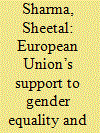

|
|
|
| 7 |
ID:
147917
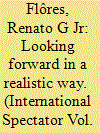

|
|
|
|
|
| Summary/Abstract |
Since taking office, High Representative and Vice President (HR/VP) Federica Mogherini, together with her perhaps closest aide, Nathalie Tocci, has led a bold and novel stance in this still sometimes misunderstood position created by the Lisbon Treaty.
|
|
|
|
|
|
|
|
|
|
|
|
|
|
|
|
| 8 |
ID:
148298
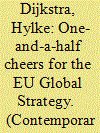

|
|
|
|
|
| Summary/Abstract |
EU High Representative Federica Mogherini presented her EU Global Strategy (EUGS) in June 2016. Encircled by security crises, it is difficult to think of something more important for Europe than collective action with the aim of weathering the storm. The EUGS, in this respect, seeks to define common ends and identify means. So what do we make of the EUGS? What does the EUGS tell us about the current role of the EU in global affairs? And how will the withdrawal of the UK from the EU affect foreign and security policy? As a way of introduction to the forum, this article notes that the EUGS focuses on the neighbourhood, puts the interests of European citizens first, identifies civilian means, and has created momentum on security policy. The key question, however, remains whether there is any interest in the EUGS beyond the foreign policy elites.
|
|
|
|
|
|
|
|
|
|
|
|
|
|
|
|
| 9 |
ID:
168959
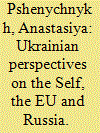

|
|
|
|
|
| Summary/Abstract |
This paper contributes to our understanding of EU-Ukraine relations by examining intersemiotic communication – how words and images, or verbal and photographic semiotic layers and their interaction, combine in the representation of international affairs. The analysis focuses on Ukraine’s perspectives of Self, the EU and Russia as presented in Ukrainian media discourse, namely, in leading Ukrainian social and political newspapers (January-June, 2016). The article presents the results of applying the cognitive theory of perspectives to research the intersemiotic and mental image of Self and Other in four aspects: a vantage point, direction of scanning, perspectival distance, and perspectival mode. Based on that, I explain the main strategic narrative of the Ukrainian press about the EU, how it is sustained, and how the image of the EU becomes pronounced.
|
|
|
|
|
|
|
|
|
|
|
|
|
|
|
|
|
|
|
|
|